module 1 unit 3Language in use
文档属性
| 名称 | module 1 unit 3Language in use |
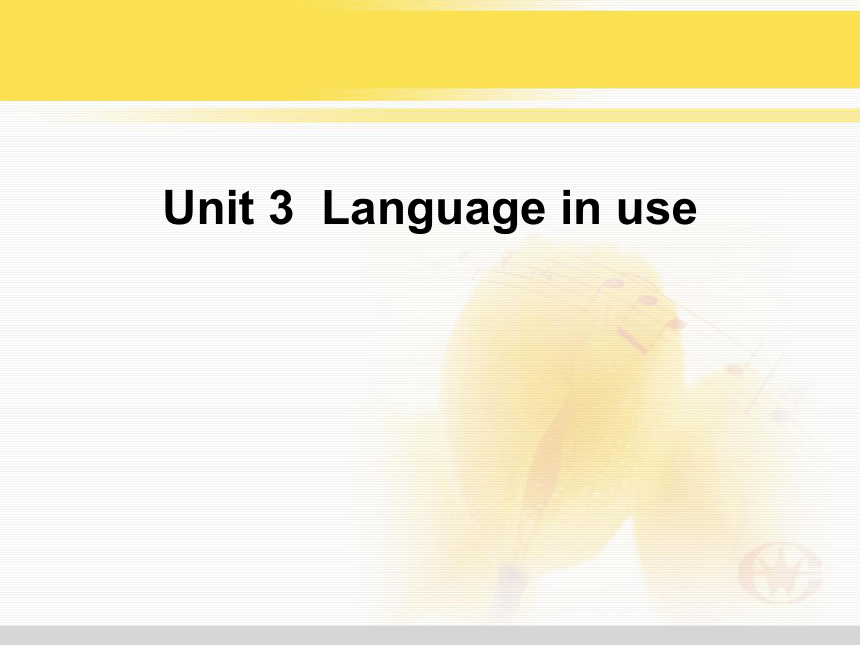
|
|
| 格式 | rar | ||
| 文件大小 | 1.4MB | ||
| 资源类型 | 教案 | ||
| 版本资源 | 外研版 | ||
| 科目 | 英语 | ||
| 更新时间 | 2008-03-02 00:00:00 | ||
图片预览

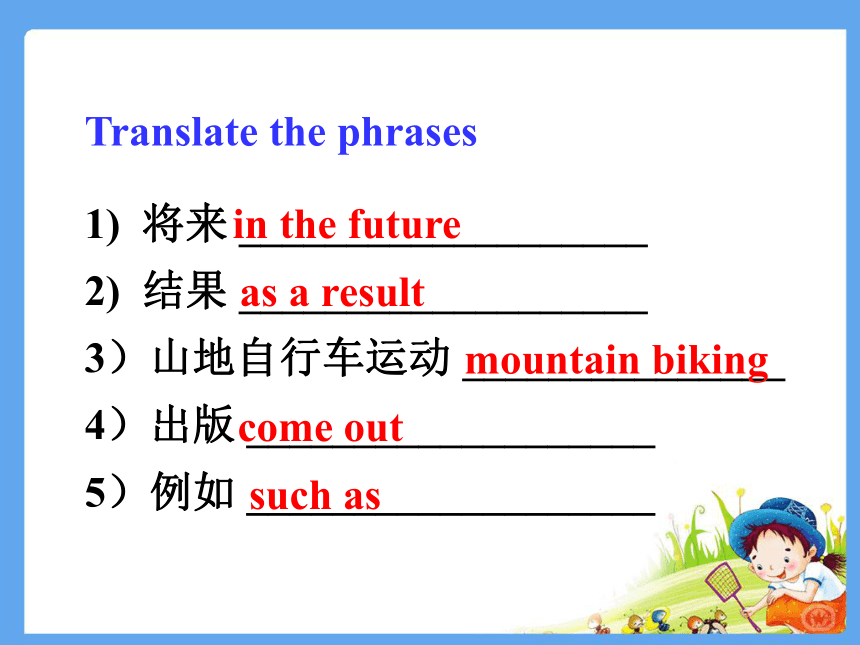

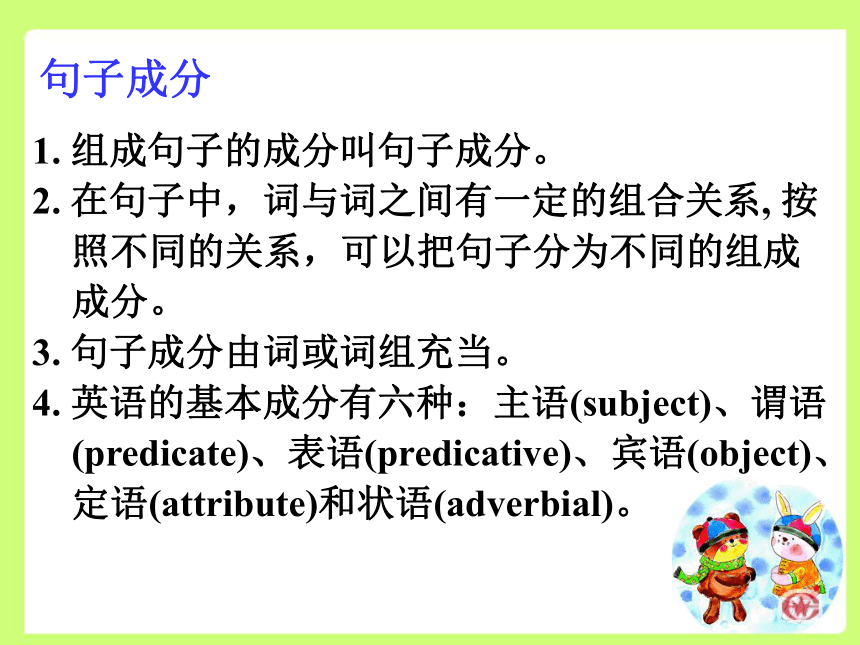
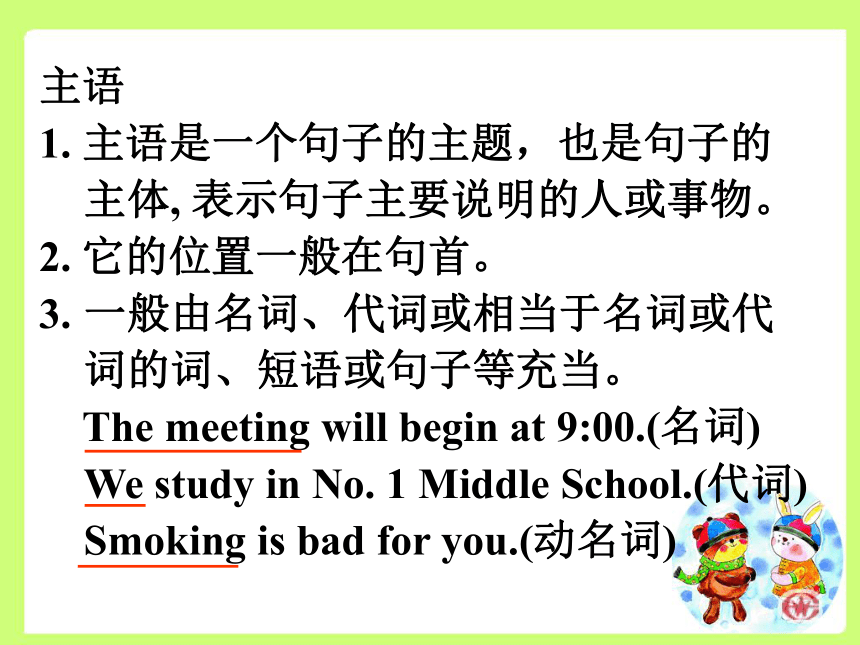
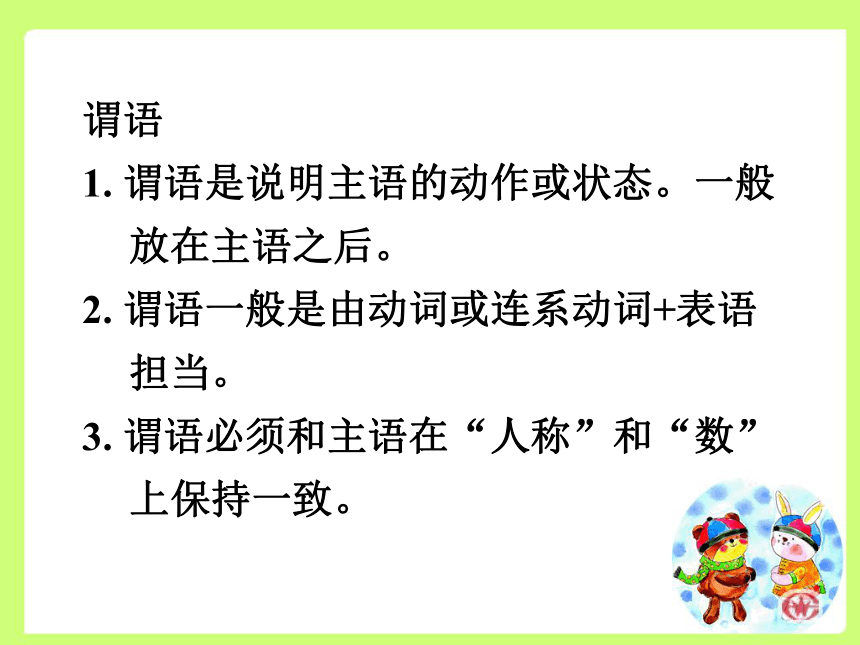
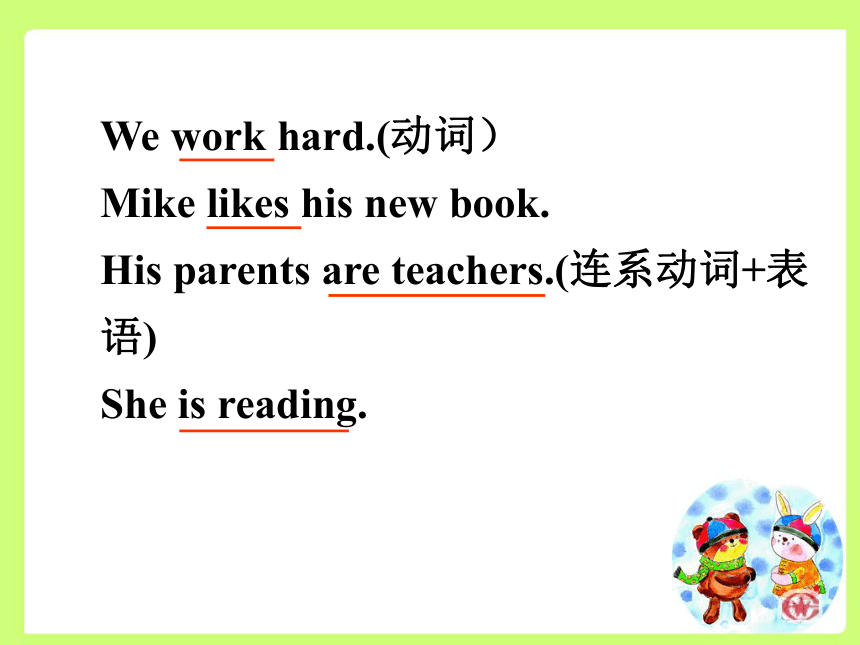
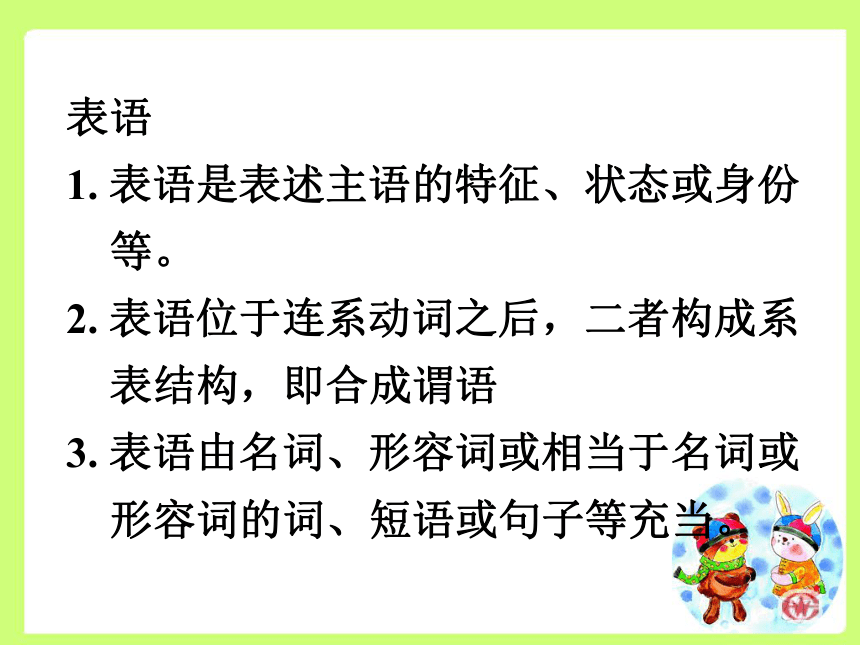

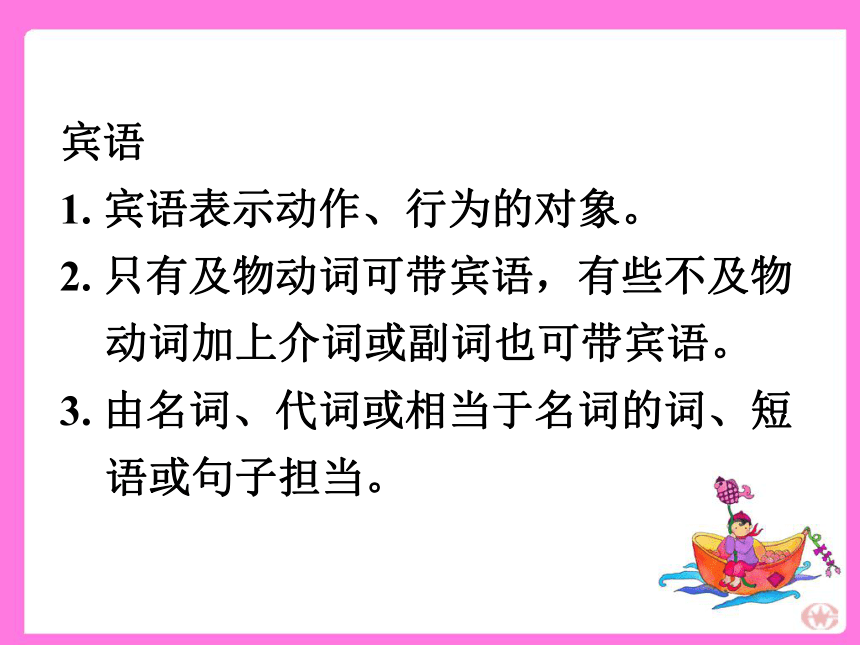
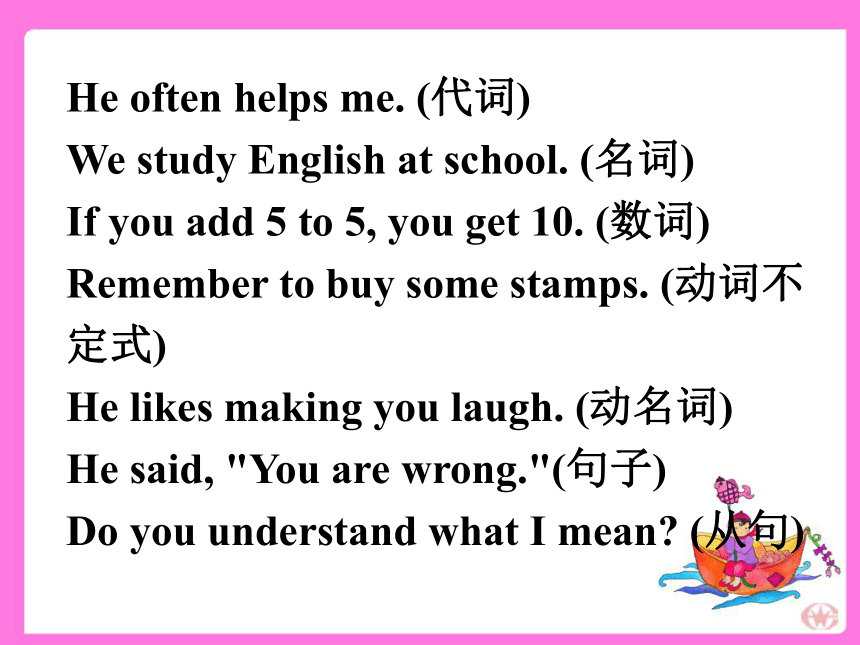
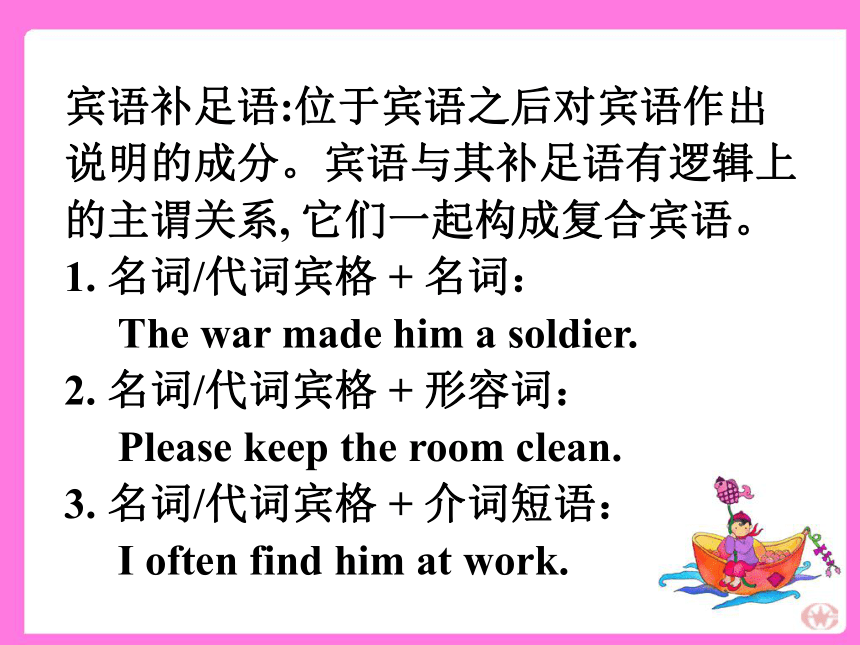
文档简介
课件39张PPT。Unit 3 Language in useTranslate the phrases将来 ___________________
结果 ___________________
3)山地自行车运动 _______________
4)出版 ___________________
5)例如 ___________________ in the future as a resultmountain biking come out such as6) 试图做某事______________
7) 整理 ___________________
8) 同...一样_________________
9) 空闲时间 _________________
10) 照顾 ____________________ try to do sth. tidy upas well as free timelook after1. 组成句子的成分叫句子成分。
2. 在句子中,词与词之间有一定的组合关系, 按照不同的关系,可以把句子分为不同的组成成分。
3. 句子成分由词或词组充当。
4. 英语的基本成分有六种:主语(subject)、谓语(predicate)、表语(predicative)、宾语(object)、定语(attribute)和状语(adverbial)。句子成分 主语
1. 主语是一个句子的主题,也是句子的主体, 表示句子主要说明的人或事物。
2. 它的位置一般在句首。
一般由名词、代词或相当于名词或代词的词、短语或句子等充当。
The meeting will begin at 9:00.(名词) We study in No. 1 Middle School.(代词) Smoking is bad for you.(动名词)谓语
1. 谓语是说明主语的动作或状态。一般放在主语之后。
2. 谓语一般是由动词或连系动词+表语担当。
3. 谓语必须和主语在“人称”和“数”上保持一致。 We work hard.(动词)
Mike likes his new book.
His parents are teachers.(连系动词+表语)
She is reading.表语
1. 表语是表述主语的特征、状态或身份等。
2. 表语位于连系动词之后,二者构成系表结构,即合成谓语
3. 表语由名词、形容词或相当于名词或形容词的词、短语或句子等充当。Her brother is a driver.(名词)
Are you ready?(形容词)
We were at home last night.(介词短语)
This book is mine, not yours.(代词)
The film is exciting.(现在分词)宾语
1. 宾语表示动作、行为的对象。
2. 只有及物动词可带宾语,有些不及物动词加上介词或副词也可带宾语。
3. 由名词、代词或相当于名词的词、短语或句子担当。 He often helps me. (代词)
We study English at school. (名词)
If you add 5 to 5, you get 10. (数词)
Remember to buy some stamps. (动词不定式)
He likes making you laugh. (动名词)
He said, "You are wrong."(句子)
Do you understand what I mean? (从句)宾语补足语:位于宾语之后对宾语作出说明的成分。宾语与其补足语有逻辑上的主谓关系, 它们一起构成复合宾语。
1. 名词/代词宾格 + 名词:
The war made him a soldier.
2. 名词/代词宾格 + 形容词:
Please keep the room clean.
3. 名词/代词宾格 + 介词短语:
I often find him at work.4. 名词/代词宾格 + 动词不定式:
The teacher ask the students to close the windows.
5. 名词/代词宾格 + 分词:
I saw a cat running across the road.状语
状语修饰动词、形容词、副词或全句, 说明方式、因果、条件、时间、地点、让步、方向、程度、目的等。用作状语的通常是副词。
1)副词 (短语) 作状语:
The boy needs a pen very much. (程 ` 度状语)
The boy, now, needs a pen.(时间状语)2) 介词短语作状语:
In the classroom, the boy needs a pen. (地点状语)
Before his mother, Tom is always a boy. (条件状语)
On Sundays, there is no student in the classroom. (时间状语) 3) 不定式作状语: The boy needs a pen to do his homework.(目的状语)
4) 名词作状语: Come this way! (方向状语)定语
1. 定语是用来修饰名词; 代词或句子的成分.
2. 定语有前置定语, 后置定语.
3. 充当定语的词有:形容词;名词;代词;数词;名词所有格......方位副词;不定式;动词的-ing形式;过去分词;从句等.例如:Tom is a handsome boy. (形容词作定语 )
His name is Tom. (代词作定语)
The boy in blue is Tom. (介词短语作定语)
There is nothing to do today. (不定式作定语)英语五种基本句型列式如下:基本句型一: S V (主+谓)
基本句型二:S V P (主+系+表)
基本句型三: S V O (主+谓+宾)
基本句型四: S V O O
(主+谓+间宾+直宾)
基本句型五:S V O C
(主+谓+宾+宾补) Complete Sentence b with the same meaning as a.
a) I saw him. He was playing the violin.
b) I saw him playing the violin.1. a) When I hear that song, I feel happy.
b) That music always makes ________
2. a) He found a wallet. The wallet was lying on the road.
b) He found ______________________.me happy.a wallet lying on the road3. a) When my mother has too much housework, I often help her.
b) I often help _____________ __________.
4) a) Parents often say: “Children should be polite.”
b) Parents often ask __________________ my mother do houseworkchildren to be polite.1. I bought my mother a new book for her birthday.
2. She showed me her stamp collection.
3. I often watch sport on TV.
4. I’m a writer.
5. I read a lot.Activity 16. My father wanted me to be a musician.
7. I heard her sing.
8. There are lots of fans in the museum.
9. I’m playing the piano. 1. We can do many interesting things in life.
2. John gave his father a very old book.
3. He reads in the evening.
4. John likes making things.
5. Last year, he made a bicycle for his brother.Activity 26. John’s mother isn’t interested in his hobby.
7. John’s room isn’t clean.
8. She feeds vegetables.
9. Her hobbies can help her save money.1. I’d like to learn another language, _______ I want to travel around the world one day.
2. The Harry Potter stories were very popular and _________ more teenagers began to enjoy reading than ever before.because as a resultActivity 33. Jane is good at singing ________ dancing.
4. At our school you can try lots of new activities, ______ creative writing and playing the piano.
5. We made a delicious cake this morning. Now we need to _______ the kitchen.as well assuch as tidy up6. I asked my parents to buy me a dog. I would ________ it.
7. Shall we ______ some time __ playing table tennis on Saturday?
8. I buy the magazines when they ________each month. look afterspend income outActivity 7 Listen and choose the best answer.1 Which hobby is the most popular with girls?
a) playing chess b) singing and dancing
c) playing football
2 Which hobby is the most popular with boys?
a) playing football
b) playing computer games
c) watching films3 Which hobby do boys and girls both
enjoy?
a) playing chess b) collecting things
c) playing table tennis
4 Which hobby helps develop new skills?
a) growing vegetables b) climbing
c) collecting stamps
5 Which hobby helps other people?
a) growing vegetables
b) collecting stamps
c) playing chessTapescriptGirl: We have some interesting results from our
survey on teenage hobbies.
Boy: What’s the most popular hobby?
Girl: Well, boys and girls have different hobbies.
The girls like singing and dancing, but the
boys prefer playing football, and they like
watching it, too.
Boy: Oh, I see. Is there anything that boys and
girls like doing?Girl: Yes, both girls and boys enjoy playing
table tennis.
Boy: Why do teenagers like their hobbies?
Girl: They like to learn about new things, and
to develop new skills. For example,
collecting stamps, and playing chess
develops thinking skills.
Boy: I see. My hobby is growing vegetables. Is
that a popular hobby?
Girl: Yes, it is. This hobby helps the whole
family.Let's read!Now if you want to make a survey about others’ hobbies, what questions do you want to ask? Discuss in groups and try to make a questionnaire. See activity 7 in Page 3, activity 4 in page 5 and activity 4 in page 7 for ideas.Make a questionnaire! Choose the best one!Questionnaire show!Work in groups of four. Ask questions
about the experiences.Module taskTask 1.Yes.Write a short passage about one of your fantastic experiences. You may choose one topic from the above discussion, such as sport, book/film, food, technology, etc. You should tell us WHAT, WHERE, WHEN, HOW, WHY and HOW you do it. You may begin like this:Task 2.I have had a fantastic experience. This afternoon, when I was on my way home, I saw a blind man (盲人) waiting at the bus stop. I …
结果 ___________________
3)山地自行车运动 _______________
4)出版 ___________________
5)例如 ___________________ in the future as a resultmountain biking come out such as6) 试图做某事______________
7) 整理 ___________________
8) 同...一样_________________
9) 空闲时间 _________________
10) 照顾 ____________________ try to do sth. tidy upas well as free timelook after1. 组成句子的成分叫句子成分。
2. 在句子中,词与词之间有一定的组合关系, 按照不同的关系,可以把句子分为不同的组成成分。
3. 句子成分由词或词组充当。
4. 英语的基本成分有六种:主语(subject)、谓语(predicate)、表语(predicative)、宾语(object)、定语(attribute)和状语(adverbial)。句子成分 主语
1. 主语是一个句子的主题,也是句子的主体, 表示句子主要说明的人或事物。
2. 它的位置一般在句首。
一般由名词、代词或相当于名词或代词的词、短语或句子等充当。
The meeting will begin at 9:00.(名词) We study in No. 1 Middle School.(代词) Smoking is bad for you.(动名词)谓语
1. 谓语是说明主语的动作或状态。一般放在主语之后。
2. 谓语一般是由动词或连系动词+表语担当。
3. 谓语必须和主语在“人称”和“数”上保持一致。 We work hard.(动词)
Mike likes his new book.
His parents are teachers.(连系动词+表语)
She is reading.表语
1. 表语是表述主语的特征、状态或身份等。
2. 表语位于连系动词之后,二者构成系表结构,即合成谓语
3. 表语由名词、形容词或相当于名词或形容词的词、短语或句子等充当。Her brother is a driver.(名词)
Are you ready?(形容词)
We were at home last night.(介词短语)
This book is mine, not yours.(代词)
The film is exciting.(现在分词)宾语
1. 宾语表示动作、行为的对象。
2. 只有及物动词可带宾语,有些不及物动词加上介词或副词也可带宾语。
3. 由名词、代词或相当于名词的词、短语或句子担当。 He often helps me. (代词)
We study English at school. (名词)
If you add 5 to 5, you get 10. (数词)
Remember to buy some stamps. (动词不定式)
He likes making you laugh. (动名词)
He said, "You are wrong."(句子)
Do you understand what I mean? (从句)宾语补足语:位于宾语之后对宾语作出说明的成分。宾语与其补足语有逻辑上的主谓关系, 它们一起构成复合宾语。
1. 名词/代词宾格 + 名词:
The war made him a soldier.
2. 名词/代词宾格 + 形容词:
Please keep the room clean.
3. 名词/代词宾格 + 介词短语:
I often find him at work.4. 名词/代词宾格 + 动词不定式:
The teacher ask the students to close the windows.
5. 名词/代词宾格 + 分词:
I saw a cat running across the road.状语
状语修饰动词、形容词、副词或全句, 说明方式、因果、条件、时间、地点、让步、方向、程度、目的等。用作状语的通常是副词。
1)副词 (短语) 作状语:
The boy needs a pen very much. (程 ` 度状语)
The boy, now, needs a pen.(时间状语)2) 介词短语作状语:
In the classroom, the boy needs a pen. (地点状语)
Before his mother, Tom is always a boy. (条件状语)
On Sundays, there is no student in the classroom. (时间状语) 3) 不定式作状语: The boy needs a pen to do his homework.(目的状语)
4) 名词作状语: Come this way! (方向状语)定语
1. 定语是用来修饰名词; 代词或句子的成分.
2. 定语有前置定语, 后置定语.
3. 充当定语的词有:形容词;名词;代词;数词;名词所有格......方位副词;不定式;动词的-ing形式;过去分词;从句等.例如:Tom is a handsome boy. (形容词作定语 )
His name is Tom. (代词作定语)
The boy in blue is Tom. (介词短语作定语)
There is nothing to do today. (不定式作定语)英语五种基本句型列式如下:基本句型一: S V (主+谓)
基本句型二:S V P (主+系+表)
基本句型三: S V O (主+谓+宾)
基本句型四: S V O O
(主+谓+间宾+直宾)
基本句型五:S V O C
(主+谓+宾+宾补) Complete Sentence b with the same meaning as a.
a) I saw him. He was playing the violin.
b) I saw him playing the violin.1. a) When I hear that song, I feel happy.
b) That music always makes ________
2. a) He found a wallet. The wallet was lying on the road.
b) He found ______________________.me happy.a wallet lying on the road3. a) When my mother has too much housework, I often help her.
b) I often help _____________ __________.
4) a) Parents often say: “Children should be polite.”
b) Parents often ask __________________ my mother do houseworkchildren to be polite.1. I bought my mother a new book for her birthday.
2. She showed me her stamp collection.
3. I often watch sport on TV.
4. I’m a writer.
5. I read a lot.Activity 16. My father wanted me to be a musician.
7. I heard her sing.
8. There are lots of fans in the museum.
9. I’m playing the piano. 1. We can do many interesting things in life.
2. John gave his father a very old book.
3. He reads in the evening.
4. John likes making things.
5. Last year, he made a bicycle for his brother.Activity 26. John’s mother isn’t interested in his hobby.
7. John’s room isn’t clean.
8. She feeds vegetables.
9. Her hobbies can help her save money.1. I’d like to learn another language, _______ I want to travel around the world one day.
2. The Harry Potter stories were very popular and _________ more teenagers began to enjoy reading than ever before.because as a resultActivity 33. Jane is good at singing ________ dancing.
4. At our school you can try lots of new activities, ______ creative writing and playing the piano.
5. We made a delicious cake this morning. Now we need to _______ the kitchen.as well assuch as tidy up6. I asked my parents to buy me a dog. I would ________ it.
7. Shall we ______ some time __ playing table tennis on Saturday?
8. I buy the magazines when they ________each month. look afterspend income outActivity 7 Listen and choose the best answer.1 Which hobby is the most popular with girls?
a) playing chess b) singing and dancing
c) playing football
2 Which hobby is the most popular with boys?
a) playing football
b) playing computer games
c) watching films3 Which hobby do boys and girls both
enjoy?
a) playing chess b) collecting things
c) playing table tennis
4 Which hobby helps develop new skills?
a) growing vegetables b) climbing
c) collecting stamps
5 Which hobby helps other people?
a) growing vegetables
b) collecting stamps
c) playing chessTapescriptGirl: We have some interesting results from our
survey on teenage hobbies.
Boy: What’s the most popular hobby?
Girl: Well, boys and girls have different hobbies.
The girls like singing and dancing, but the
boys prefer playing football, and they like
watching it, too.
Boy: Oh, I see. Is there anything that boys and
girls like doing?Girl: Yes, both girls and boys enjoy playing
table tennis.
Boy: Why do teenagers like their hobbies?
Girl: They like to learn about new things, and
to develop new skills. For example,
collecting stamps, and playing chess
develops thinking skills.
Boy: I see. My hobby is growing vegetables. Is
that a popular hobby?
Girl: Yes, it is. This hobby helps the whole
family.Let's read!Now if you want to make a survey about others’ hobbies, what questions do you want to ask? Discuss in groups and try to make a questionnaire. See activity 7 in Page 3, activity 4 in page 5 and activity 4 in page 7 for ideas.Make a questionnaire! Choose the best one!Questionnaire show!Work in groups of four. Ask questions
about the experiences.Module taskTask 1.Yes.Write a short passage about one of your fantastic experiences. You may choose one topic from the above discussion, such as sport, book/film, food, technology, etc. You should tell us WHAT, WHERE, WHEN, HOW, WHY and HOW you do it. You may begin like this:Task 2.I have had a fantastic experience. This afternoon, when I was on my way home, I saw a blind man (盲人) waiting at the bus stop. I …
同课章节目录
- Module 1 Feelings and impressions
- Unit 1 It smells delicious.
- Unit 2 I feel nervous when I speak Chinese .
- Unit 3 Language in use
- Module 2 Experiences
- Unit 1 I've also entered lots of speaking competi
- Unit 2 They have seen the Pyramids.
- Unit 3 Language in use
- Module 3 Journey to space
- Unit 1 Has it arrived yet?
- Unit 2 We have not found life on any other planet
- Unit 3 Language in use
- Module 4 Seeing the docto
- Unit 1 I haven't done much exercise since I got m
- Unit 2 We have played football for a year now
- Unit 3 Language in use
- Module 5 Cartoons
- Unit 1 It's time to watch a cartoon.
- Unit 2 Tintin has been popular for over eighty yea
- Unit 3 Language in use
- Revision module A
- Module 6 Hobbies
- Unit 1 Do you collect anything ?
- Unit 2 Hobbies can make you grow as a person.
- Unit 3 Language in use
- Module 7 Summer in Los Angeles
- Unit 1 Please write to me and send me some photos
- Unit 2 Fill out a form and come to learn English
- Unit 3 Language in use
- Module 8 Time off
- Unit 1 I can hardly believe we are in the city ce
- Unit 2 We thought somebody was moving about
- Unit 3 Language in use
- Module 9 Friendship
- Unit 1 Could I ask if you've mentioned this to he
- Unit 2 I believe that the world is what you think
- Unit 3 Language in use
- Module 10 On the radio
- Unit 1 I hope that you can join us one day
- Unit 2 It seemed that they were speaking to me in
- Unit 3 Language in use
- Revision module B
